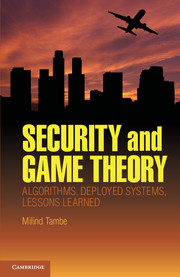1 - Introduction and Overview of Security Games
Published online by Cambridge University Press: 05 January 2012
Summary
Introduction
Game theory's popularity continues to increase in a whole variety of disciplines, including economics, biology, political science, computer science, electrical engineering, business, law, and public policy. In the arena of security, where game theory has always been popular, there now seems to be an exponential increase in interest. This increase is in part due to the new set of problems our societies face, from terrorism to drugs to crime. These problems are ubiquitous. Yet, limited security resources cannot be everywhere all the time, raising a crucial question of how to best utilize them.
Game theory provides a sound mathematical approach for deploying limited security resources to maximize their effectiveness. While the connection between game theory and security has been studied for the last several decades, there has been a fundamental shift in the relationship due to the emergence of computational game theory. More specifically, with the development of new computational approaches to game theory over the past two decades, very large-scale problems can be cast in game-theoretic contexts, thus providing us computational tools to address problems of security allocations.
My research group has been at the forefront of this effort to apply computational game theory techniques to security problems. We have led a wide range of actual deployed applications of game theory for security. Our first application, Assistant for Randomized Monitoring Over Routes (ARMOR), successfully deployed game-theoretic algorithms at the Los Angeles International Airport (LAX) in 2007 and has been in use there ever since.
- Type
- Chapter
- Information
- Security and Game TheoryAlgorithms, Deployed Systems, Lessons Learned, pp. 1 - 24Publisher: Cambridge University PressPrint publication year: 2011

